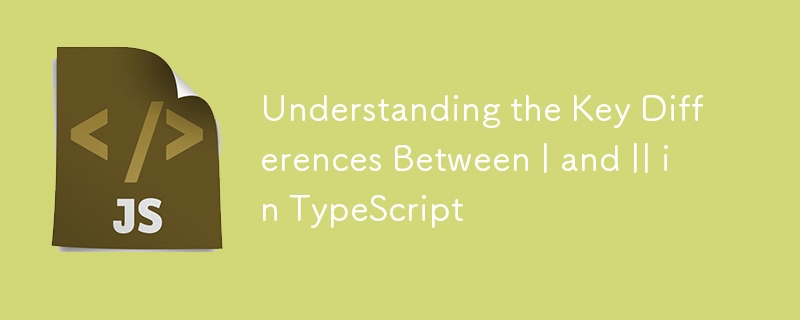

This blog post will show the difference between these two operators.
In TypeScript, operators are essential tools that allow us to manipulate data and control the flow of applications. Among the various operators, the pipe symbol (|) and the double pipe symbol (||) are often used, but they serve very different purposes.
Understanding the difference between these two operators is crucial for writing efficient and error-free code.
The single pipe (|) in TypeScript is known as the union type operator. It allows a variable to hold one of several types, essentially broadening the range of acceptable values for that variable.
On the other hand, the double pipe (||) is the logical OR operator, used to evaluate expressions and return the first truthy value encountered, or the last value if all are falsy.
The union type (|) is vital for situations where a variable can legitimately represent multiple types, offering flexibility while maintaining type safety.
The logical OR operator (||), however, is often used in control flow to set default values or short-circuit evaluations, making it a powerful tool in conditional statements.
function getId(id: string | number): string {
return `ID: ${id}`;
}
const username = inputUsername || 'Guest';
Union Type (|):
Logical OR (||):
Both the union type (|) and the logical OR (||) operators are powerful tools in TypeScript, each with its specific use cases and benefits.
if you have any suggestions or questions let me know in comment.
The above is the detailed content of Understanding the Key Differences Between | and || in TypeScript. For more information, please follow other related articles on the PHP Chinese website!
 What does harmonyos mean?
What does harmonyos mean?
 Which is better to learn first, c language or c++?
Which is better to learn first, c language or c++?
 What is the difference between ibatis and mybatis
What is the difference between ibatis and mybatis
 How to recover deleted WeChat chat history
How to recover deleted WeChat chat history
 What are the differences between cellpadding and cellspacing?
What are the differences between cellpadding and cellspacing?
 What format is m4a?
What format is m4a?
 index.html function
index.html function
 Introduction to the usage of rowid in oracle
Introduction to the usage of rowid in oracle




